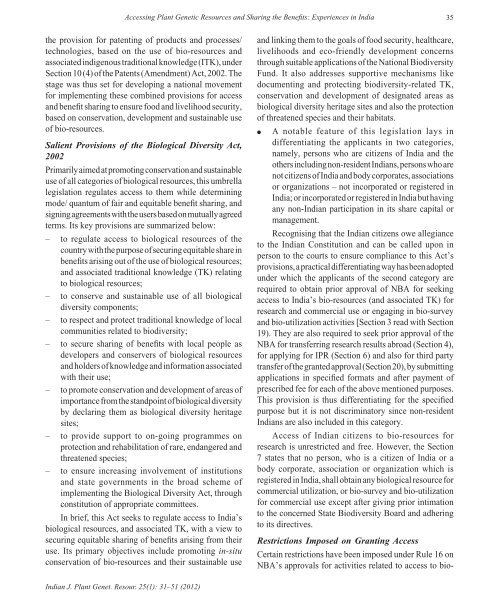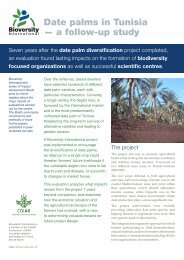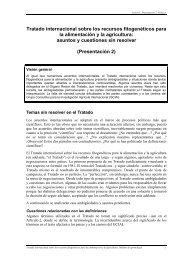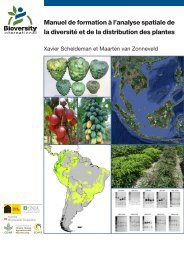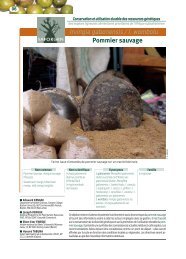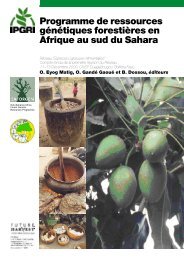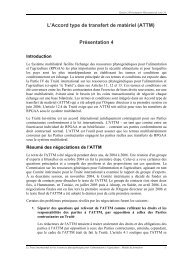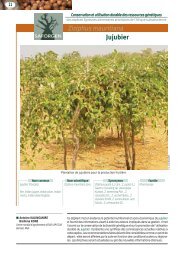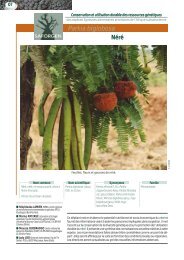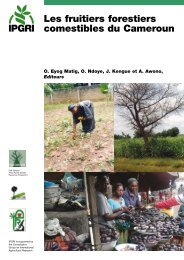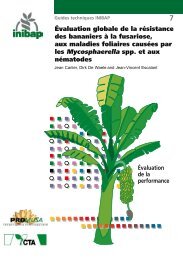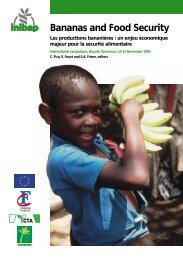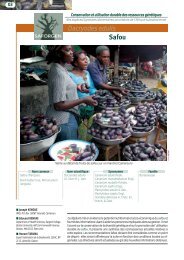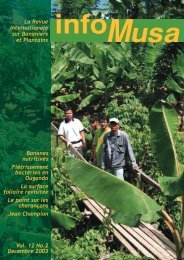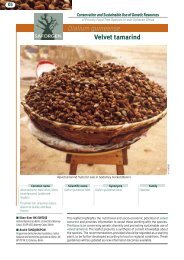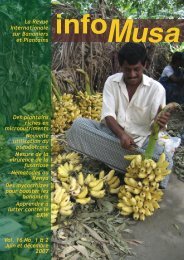indian society of plant genetic resources - Bioversity International
indian society of plant genetic resources - Bioversity International
indian society of plant genetic resources - Bioversity International
Create successful ePaper yourself
Turn your PDF publications into a flip-book with our unique Google optimized e-Paper software.
Indian J. Plant Genet. Resour. 25(1): 31–51 (2012)<br />
Accessing Plant Genetic Resources and Sharing the Benefi ts: Experiences in India 35<br />
the provision for patenting <strong>of</strong> products and processes/<br />
technologies, based on the use <strong>of</strong> bio-<strong>resources</strong> and<br />
associated indigenous traditional knowledge (ITK), under<br />
Section 10 (4) <strong>of</strong> the Patents (Amendment) Act, 2002. The<br />
stage was thus set for developing a national movement<br />
for implementing these combined provisions for access<br />
and benefi t sharing to ensure food and livelihood security,<br />
based on conservation, development and sustainable use<br />
<strong>of</strong> bio-<strong>resources</strong>.<br />
Salient Provisions <strong>of</strong> the Biological Diversity Act,<br />
2002<br />
Primarily aimed at promoting conservation and sustainable<br />
use <strong>of</strong> all categories <strong>of</strong> biological <strong>resources</strong>, this umbrella<br />
legislation regulates access to them while determining<br />
mode/ quantum <strong>of</strong> fair and equitable benefi t sharing, and<br />
signing agreements with the users based on mutually agreed<br />
terms. Its key provisions are summarized below:<br />
– to regulate access to biological <strong>resources</strong> <strong>of</strong> the<br />
country with the purpose <strong>of</strong> securing equitable share in<br />
benefi ts arising out <strong>of</strong> the use <strong>of</strong> biological <strong>resources</strong>;<br />
and associated traditional knowledge (TK) relating<br />
to biological <strong>resources</strong>;<br />
– to conserve and sustainable use <strong>of</strong> all biological<br />
diversity components;<br />
– to respect and protect traditional knowledge <strong>of</strong> local<br />
communities related to biodiversity;<br />
– to secure sharing <strong>of</strong> benefi ts with local people as<br />
developers and conservers <strong>of</strong> biological <strong>resources</strong><br />
and holders <strong>of</strong> knowledge and information associated<br />
with their use;<br />
– to promote conservation and development <strong>of</strong> areas <strong>of</strong><br />
importance from the standpoint <strong>of</strong> biological diversity<br />
by declaring them as biological diversity heritage<br />
sites;<br />
– to provide support to on-going programmes on<br />
protection and rehabilitation <strong>of</strong> rare, endangered and<br />
threatened species;<br />
– to ensure increasing involvement <strong>of</strong> institutions<br />
and state governments in the broad scheme <strong>of</strong><br />
implementing the Biological Diversity Act, through<br />
constitution <strong>of</strong> appropriate committees.<br />
In brief, this Act seeks to regulate access to India’s<br />
biological <strong>resources</strong>, and associated TK, with a view to<br />
securing equitable sharing <strong>of</strong> benefi ts arising from their<br />
use. Its primary objectives include promoting in-situ<br />
conservation <strong>of</strong> bio-<strong>resources</strong> and their sustainable use<br />
and linking them to the goals <strong>of</strong> food security, healthcare,<br />
livelihoods and eco-friendly development concerns<br />
through suitable applications <strong>of</strong> the National Biodiversity<br />
Fund. It also addresses supportive mechanisms like<br />
documenting and protecting biodiversity-related TK,<br />
conservation and development <strong>of</strong> designated areas as<br />
biological diversity heritage sites and also the protection<br />
<strong>of</strong> threatened species and their habitats.<br />
● A notable feature <strong>of</strong> this legislation lays in<br />
differentiating the applicants in two categories,<br />
namely, persons who are citizens <strong>of</strong> India and the<br />
others including non-resident Indians, persons who are<br />
not citizens <strong>of</strong> India and body corporates, associations<br />
or organizations – not incorporated or registered in<br />
India; or incorporated or registered in India but having<br />
any non-Indian participation in its share capital or<br />
management.<br />
Recognising that the Indian citizens owe allegiance<br />
to the Indian Constitution and can be called upon in<br />
person to the courts to ensure compliance to this Act’s<br />
provisions, a practical differentiating way has been adopted<br />
under which the applicants <strong>of</strong> the second category are<br />
required to obtain prior approval <strong>of</strong> NBA for seeking<br />
access to India’s bio-<strong>resources</strong> (and associated TK) for<br />
research and commercial use or engaging in bio-survey<br />
and bio-utilization activities [Section 3 read with Section<br />
19). They are also required to seek prior approval <strong>of</strong> the<br />
NBA for transferring research results abroad (Section 4),<br />
for applying for IPR (Section 6) and also for third party<br />
transfer <strong>of</strong> the granted approval (Section 20), by submitting<br />
applications in specifi ed formats and after payment <strong>of</strong><br />
prescribed fee for each <strong>of</strong> the above mentioned purposes.<br />
This provision is thus differentiating for the specifi ed<br />
purpose but it is not discriminatory since non-resident<br />
Indians are also included in this category.<br />
Access <strong>of</strong> Indian citizens to bio-<strong>resources</strong> for<br />
research is unrestricted and free. However, the Section<br />
7 states that no person, who is a citizen <strong>of</strong> India or a<br />
body corporate, association or organization which is<br />
registered in India, shall obtain any biological resource for<br />
commercial utilization, or bio-survey and bio-utilization<br />
for commercial use except after giving prior intimation<br />
to the concerned State Biodiversity Board and adhering<br />
to its directives.<br />
Restrictions Imposed on Granting Access<br />
Certain restrictions have been imposed under Rule 16 on<br />
NBA’s approvals for activities related to access to bio-


